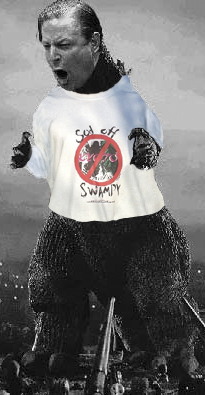I’m sure we’ve all known someone at places we’ve worked who has cheated the company, be it via creative fudging on expense reports, using the company credit cards for private purchases or other forms of, well, stealing. But all of them look like rank amateurs compared to this as of yet unnamed fellow who managed to defraud Societe Generale of $7.1 billion
French bank Societe Generale says it has uncovered a fraud by a Paris-based trader which resulted in a loss of 4.9bn euros ($7.1bn; £3.7bn).
The bank said the fraud was based on simple transactions, but concealed by “sophisticated and varied techniques”.
It also announced new write-downs of 2.05bn euros related to the sub-prime mortgage crisis in the US.
The bank’s shares, which were suspended in the morning, lost 3.6% when they resumed trading.
The bank, one of France’s largest, will need to seek 5.5bn euros in new capital to offset the losses.
But it said it would still make a profit of 600m to 800m euros for 2007, despite the blow to its balance sheet.
“One trader… had taken massive fraudulent directional positions in 2007 and 2008 beyond his limited authority,” the bank said.
It added that the trader had “in-depth knowledge of the control procedures resulting from this former employment in the middle-office”.
“The transactions which involved the fraud were simple – taking a position on shares rising – but hidden using extremely sophisticated and varied techniques,” chief executive Daniel Bouton said in a letter to the bank’s customers.
The bank said that the trader had confessed to the fraud and was being dismissed. His managers were to leave the bank as well.
That’s “billion” with a “b”.
How the hell does something like this go on? Well, there’s a couple of ways. Firstly, I agree with this fellow
“I am sorry but I have a hard time buying the fact that a trader was able to set up a ‘secret trade’ of 4.9 billion without anybody finding out,” said Ion-Marc Valhi at Amas Bank.
There’s no doubt these trades were noticed; in fact, probably the next day. The real question is how they were explained and justified. My first thought was that this was accomplished via mis-valuation of positions. This sort of thing happens all the time in futures and commodities. Accountants know accounting; they have no clue about futures or options, so quite often when we are audited our auditors ask us to value the positions so they can figure out profits or loss, as absurd as that seems. It is therefore very easy for a dishonest (or just plain stupid) trader to float along for a few years showing ‘profits’ by over-valuing his positions; eventually it does catch up to you, of course, but you can get away with it for a little while.
But it seems that wasn’t the case here
The alleged fraud took place in Paris, and – in SocGen’s words – was carried out in “plain vanilla futures hedging on European equity market indices”. So there was no connection to CDOs or structured finance.
I simply can’t understand at this point how this was accomplished via regular futures trades without a lot of people involved. There’s just too many hands that these trades have to go through every day; someone should have said ‘wait a minute’ pretty early on.
UPDATE: According to this report he “did not directly benefit from the fraud.” So my curiosity has increased further. We trade on electronic machines, and it is very easy to enter trades you don’t mean to. So we have what are called ‘fat finger’ filters on our machines for an added level of protection, for as any reader of the Swilling will attest my typing is atrocious, and there have been many times where I have meant to sell, say, 10 lots of futures but my damned fingers typed 100…or 1000. And the filters make you stop for one second and confirm what you want to do, which has saved me thousands of dollars.
Having said that, I can’t imagine making a multi-billion dollar error. One guess is that he made a multi-million dollar error, perhaps, which is easy enough to do in stock futures trading, and instead of reversing it immediately and taking his relatively minor (albeit very painful none-the-less) lumps he thought he’d be cute and trade his way out of it and put on a huge option position which has gotten completely blown out by the worldwide stock downturn.
Update: All your croissant are belong to us











 Do you mean call both of them, instead? Call one more than once…or…don’t call them at all?
Do you mean call both of them, instead? Call one more than once…or…don’t call them at all?




